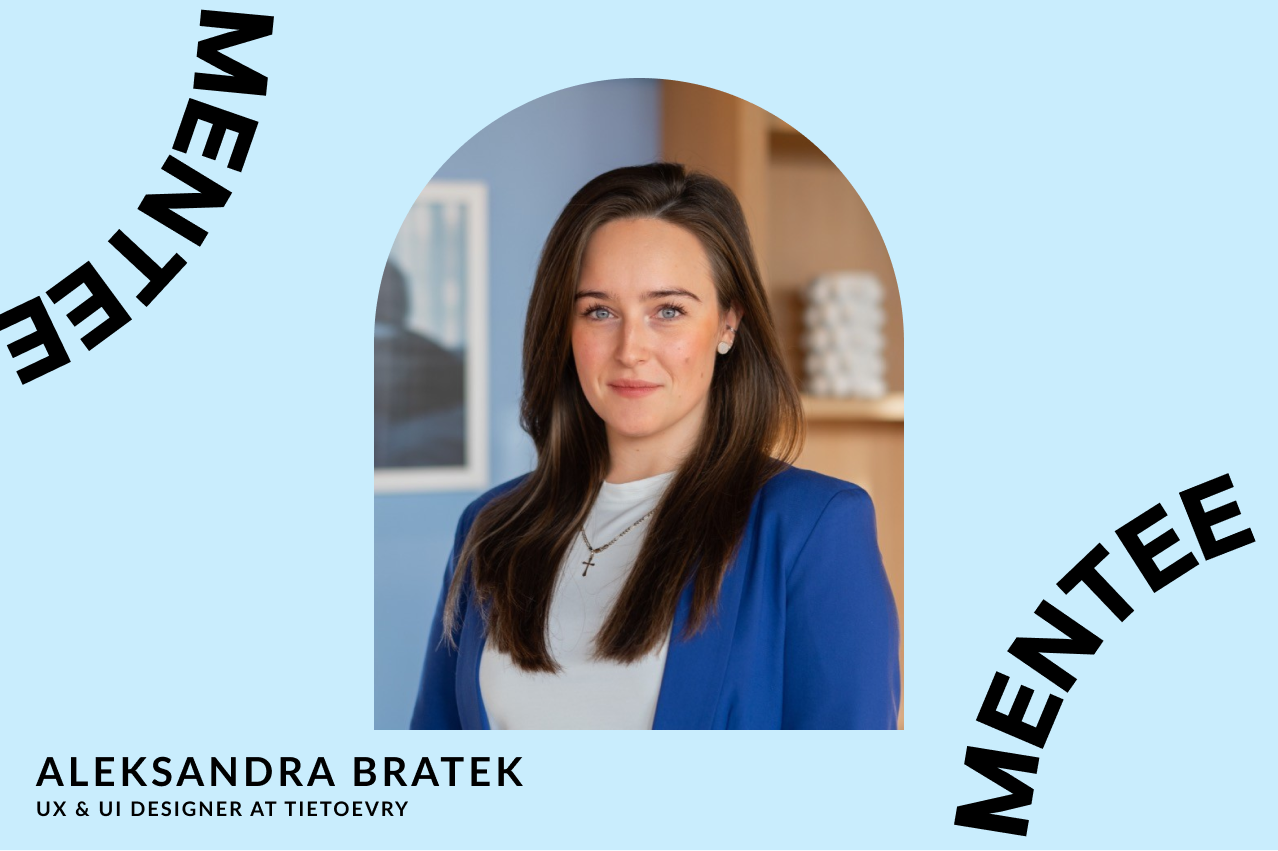
Matej Krejci is a personal advisor, consultant, and therapist. He is the author of DigiDetox - a guide to digital minimalism, and a mentor in the Femme Palette mentoring program. He is based in Brno, where we meet over tea to discuss his experience with mentoring and why he asks people what makes them happy.
Matej, thank you for making time to chat with me. Let’s start with your favorite question: What made you happy today?
M: Today, I was happy when I was leaving for Vienna and my girlfriend told me she would look after my dog. Since she is not fond of her, this was a great gesture which I appreciate very much and is a big step in the direction of getting closer and more serious in our relationship.
Tell me, why do you usually ask people what made them happy.
M: The reason is that most people ask about how you are, and the answer does not tell you much - it is either good or bad or another simple answer. And that is a pity because I want to learn more about people, their feelings, and experiences. My mission is to teach others to think differently. Most people tend to think negatively, meaning if I ask them what went wrong, they can name multiple items. Whereas in the case of positive thinking, the list is not as long…
This question makes them stop and think, realize the moment they are in, and that they are with me. And then they start thinking about what really made them happy and either realize that nothing, which might push them to reconsider their life, or forces them to try and ‘strike a spark’ in the day and think of one thing that went well so they can answer my question.

Photo credit: Oldrich Hrb
You have a creative job. When you feel stuck, what techniques help you get over it?
M: The greatest disadvantage of freelancing is the lack of people. It is crucial what kind of people you surround yourself with. Loneliness is the part I hate the most and I see it as the biggest failure of this buzz word or big dream many are striving for. I can have multiple influences around me but it is incomparable to working as a part of a team where you can instantly share the successes as they come.
A part of my job is working independently - which I don’t mind but it is exhausting in the long-term. For example, you cannot discuss an email with a colleague before you send it off to a client. It is different from a company where you can always find someone for help and support.
I substitute the lack of human connection with meeting friends and taking dance lessons. I enjoy meeting new people and asking unusual questions. It is fascinating to watch people think about the answers. E.g. What made you happy? How do you perceive success? If you could improve one thing in your brainstorming process, what would you do differently?
Working with people must be exhausting at times, what helps you recharge?
M: Yes, that is true. When I have two workshops in a day or four consultations in a row, I come home and collapse in bed with Little Prince and read. Or I take my dog out for a walk and do not talk to anyone. And that is natural. I do not perceive it as anything negative but as a necessary part of spiritual hygiene which I truly enjoy.
I am an introvert in spirit but also an extrovert. I enjoy the opposite ends of the spectrum, depressions, celebrations, exploring the versatility of my personality. Sometimes I want to spend time with people, sometimes I don’t.
So you are listening to your body’s signals…
M: I try to do as much as I can.

Photo credit: Oldrich Hrb
As a mentor/therapist, what role do you think does personal and professional development play in our lives?
M: Super important one. It is what substitutes education. I see education as a way to access information and people. There are libraries, schools, tutors available at your fingertips and it is up to you to make the most out of them. And that is the beauty of personal development.
Also, for everyone who wants to achieve something, it is key to have a mentor. Someone with a neutral, objective opinion. You must have someone next to you. You cannot do it alone.
How did you get around to mentoring?
M: I have known the value of mentoring for a while, previously I was a part of a team but I only truly realized its value once I became self-employed. Now that I am finishing off all the details, thinking about what to do next and approach inspiration, that is when mentoring comes in.
And I read it in the CVs of successful people, too. From Havel to Musk, from Einstein to da Vinci, everybody had a mentor. Nobody did it alone.
Could you describe your experience with mentoring?
M: As a mentor, I enjoy playing multiple roles. One side is the devil’s advocate, meaning that if someone has an ‘amazing’ idea - I ask: what if nobody wants this product, what if it's not that great. Pose the type of questions your friends or family would never do. That is what I enjoy.
On the contrary, when someone has a great idea but does not believe in themselves, I try to share good examples and tools to help boost their confidence. I tell them it is okay to have doubts but also highlight that they need to hold on, so they can rise again.
Sometimes, you have to be an executioner and say - sorry but this idea already exists in a thousand other ways, so do not bother. With every project, I try to find out whether the mentee does it for money or passion. With the former, I tell them to stop, with the latter we attempt together to find ways to join a community around that particular idea.
Simultaneously, I try to share the experience and knowledge I have gained from friends and businesses I worked with over the past seven years and it is up to the individual to decide whether they will take it or not.

Photo credit: Oldrich Hrb
What is your greatest achievement as a mentor?
M: Everybody is making progress. It depends on the point of view. One of my greatest successes is to see the mentee grow without saying thanks for it. This is the case when they come to the solution themselves and you know you guided them well.
Based on your experience, does gender affect the nature of mentoring?
M: There are certain differences. Men tend to hit a problem head-on, even if the probability to succeed is only 60%. On the contrary, women will be hesitant even if the probability of success is 90%. But age does not matter. What I care about is the way people think, how they approach problems, what are the possible solutions and outcomes they see. In the age of the internet, any information can be found almost instantly and it is the way we invest our time that matters. And that is not impacted by age nor gender.
Does being a mentor affect your own mentoring experience as a mentee?
M: I adjust my approach accordingly to the person. I am very honest with my mentees. At the beginning of every meeting, I assure them that I will ask them bad questions - bad for them, good for the future. And I warn them that I will offend them as well as to compliment them.
Every person needs an individual approach but with every mentee, you must identify the limits. Of course, there are guidelines for mentors but rather than being arrogant Mr. Know It All, I ask - is now the time to share my opinion? Yes/no. They can choose to do what they need.

Photo credit: Oldrich Hrb
What is one thing you realized during your mentoring journey?
M: Define expectations. Decide what does the mentee need - not want. Many mentees want to start a business, perhaps they have a great project but they need to settle first, or maybe they are settled but cannot pick just one idea and need someone to help them decide.
What is the one thing you wish you knew before you began mentoring?
M: A good idea is to send out a questionnaire before the session to help decide what kind of approach the mentee needs and what stage the project and/or their life is at. Also, education is very essential, to be clear on what mentoring is and what impact it can have on one’s life.
What mentoring means to you?
M: Mentoring is a journey. The goal is to create a team together with the mentee and find ways to help the mentee move forward and simultaneously show the mentor new answers and approaches. A mentor is a person interested in people.
What is the role of mentoring?
M: Therapy is important since people do not know how to speak to each other anymore. Mentoring is crucial because we surround ourselves with people who cannot say no to us. But we need to know the truth, though it might be uncomfortable at times.
The creation of a community is also necessary. It is not a weakness to have a mentor, quite the contrary. I am strong enough to be able to co-create a project with someone else. And so, if you want to run an independent project, you must surround yourself with the right people.
In every discussion, there must be someone who asks the unexpected question. Someone who does not perfectly understand the project but asks: who is your customer, who will pay for your product, how do you address your customers. That is the role of a mentor.

Photo credit: Oldrich Hrb
Matej is a person in the right place. As a mentor, he encourages people to think differently, to reflect, and justify their choices. As a freelancer, he realizes the importance of community and its role in pushing an idea forward. As a successful author, he shares his advice and experiences with others to impact their professional and personal growth. We are proud to have him as a mentor in one of our programs.
You can meet him and other inspiring mentors in the Femme Palette professional mentoring program who will help you elevate your career or have the inspiring conversation you have been longing for.
Interested in becoming a mentor but not sure if you have what it takes? Take our specially designed Mentor quiz to find out if you have it in you. It's quick and fun!



